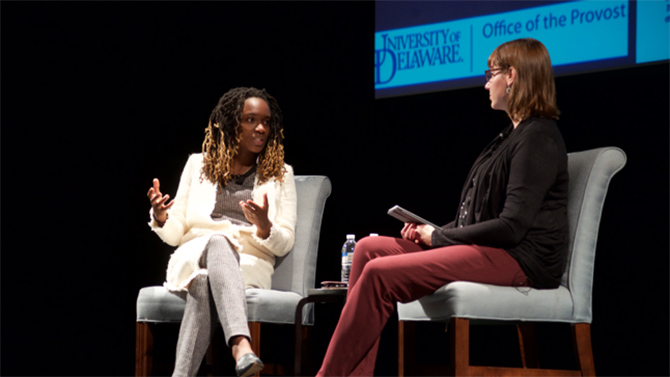


A place 'where all voices matter'
Photo by Duane Perry September 30, 2016
Film ‘Remixing Colorblind’ addresses racial climate on campus
During the screening of the documentary, Remixing Colorblind at the University of Delaware on Wednesday, Sept. 28, the film’s director, Sheena Howard, described how easy it is to walk around a college campus and assume that everything is OK with regard to the racial climate.
No one’s protesting. Everybody’s getting along. According to Howard, complacency is normal when we stay within our circle of friends or our circle of colleagues.
But, Howard encouraged the audience to challenge that frame of mind. To truly have an accurate understanding of the campus racial climate, she feels you need to expand your sources of information.
“I think you really have to think outside of yourself and talk to people who are not like you and are not in your groups to be able to understand that they are having a different set of experiences on the college campus than you are,” she said. “And that takes work. It takes initiative for a student to learn about someone else’s experiences.“
Howard, an associate professor of communication at Rider University, provided brief remarks prior to the film’s screening. Following the film, Howard was joined on stage by Lindsay Hoffman, associate professor of communication and of political science and associate director of the Center for Political Communication. Hoffman moderated the discussion and the question-and-answer session that followed.
The event was sponsored by the College of Arts and Sciences, the Center of Political Communication, the Center for Black Culture and the Office of the Provost.
Through interviews with current students, professors and administrators, the film examines how an individual’s experience within the educational system has influenced their understanding of issues related to race within the context of higher education.
For some students, that understanding begins with the application for admission when they must decide how to check the ethnicity box. Selecting the appropriate box is a simple, straightforward process for many students, but for others it is filled with anxiety and stress.
In the film, a biracial student explained that she felt torn between checking African-American or Caucasian, because selecting one box over the other was, in a sense, asking her to leave out half of her heritage.
Campus diversity is an important criterion during the college selection process, too, according to Howard, who disagreed with an admissions officer featured in the film. The administrator felt that diversity doesn’t matter to high school students when looking for a place to go to college.
“I think when a student does a campus tour – walks around the college – they are looking for some people that look like them. They are looking for certain things that say this university makes me feel safe in a certain way. I can be here. I can be here on my own. I do think {students] want to see people they can connect with,” Howard said.
Howard acknowledged that changing the culture on college campuses is complicated by issues unique to higher education, such as tenure. “With the tenure process … people stay for a really long time,” said Howard. “At Rider University where I teach, the average age of our faculty is 68. They’re there 20, 30 years, and they are mostly white males. And so it’s hard to change the numbers when there is not even any room for people to get in. And then when there is room for people to get in, people are hiring people that look like them.”
Perhaps one of the keys to changing the culture is having good data. Howard proposed that while people understand personal stories, relating the stories and experiences to an institution’s actual diversity data provides an important context. “It makes you feel like you are not crazy,” she said. “Then you can really have a conversation with people. These are actually the numbers.“
In addition to directing the film, Howard is the author of the Eisner award-winning book Black Comics: Politics of Race and Representation and also of Black Queer Identity Matrix. She holds a doctorate from Howard University.
For Howard, improving the campus climate is what it’s all about.
“That’s one of the reasons that I created this documentary,” said Howard. “So that predominately white institutions can start to be proactive in making their campuses places where everybody wants to come, where everybody can learn, where all voices matter.“
Contact Us
Have a UDaily story idea?
Contact us at ocm@udel.edu
Members of the press
Contact us at 302-831-NEWS or visit the Media Relations website

